The French breakfast radish may not be your go-to choice for breakfast, and they’re not really eaten during French morning meals either. However, with their unmistakable crunch, vibrant colours and spice, radishes make for a delightful and attractive accompaniment to any meal, not just salads.
We will show you just how easy it is to grow this popular vegetable and the best ways to sow, care for, harvest and store the bountiful crops you’re sure to reap.
More...
Watch our video on how to grow French breakfast radishes for detailed instructions and helpful tips!
Family: | Brassicaceae |
|---|---|
Genus: | Raphanus |
Species: | R. Sativus |
Common names: | French Breakfast Radish |
Origin: | Europe (developed from Southeast Asian varieties) |
Location: | Outdoor |
Type: | Edible root |
Growth: | 20cm x 20cm (1m in flower) |
Sun requirements: | Full sun or light shade |
Foliage colour: | Green |
Flower colour: | Yellow |
Flowering: | Summer |
Edible parts: | All parts are edible |
Maintenance level: | Low |
Poisonous for pets: | Not toxic to any pets |
What are French Breakfast Radishes?
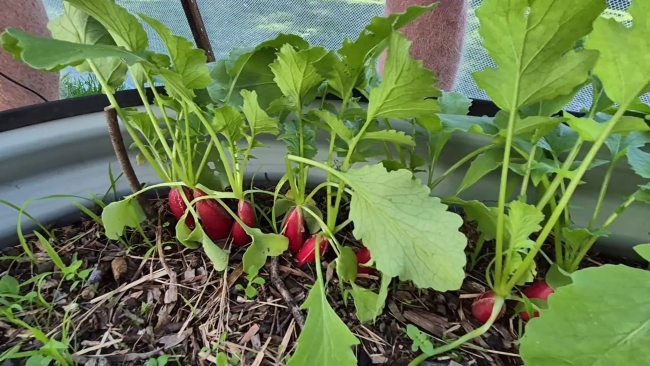
French breakfast radishes are a firm favourite of both growers and gourmets. This heirloom variety of radishes has been cultivated since the 1800’s, first introduced and sold in Parisian markets.
The radish (Raphanus sativus) belongs to the Brassicaceae family where there are over 100 radish cultivars, and dozens of variations on ‘French Breakfast’, including ‘French Breakfast 3’ and ‘French Dressing’. They are often used to breed with and create new varieties as this heirloom radish has desirable and beneficial characteristics.
Often milder in flavour than other radishes but still peppery and delicately sweet, French breakfast radishes are elongated in shape and have a two-tone colouring.
The classic but perfect oblong shape with clean white tips, crisp white flesh and bright red skin are iconic of the French breakfast radish. They are often adorned with lighter green foliage and roots, on average, reaching around 5-8cm long.
How to Grow French Breakfast Radishes
Radishes are renowned for their easy-growing nature, and the French breakfast radish is no different. If you want to know more about radishes, check out our in-depth guide to growing radishes in Australia, for everything you need to know and more details about pests, and harvest tips.
Here, I want to share some of the basic and mind-bogglingly simple ways you can grow your own French breakfast radishes at home.
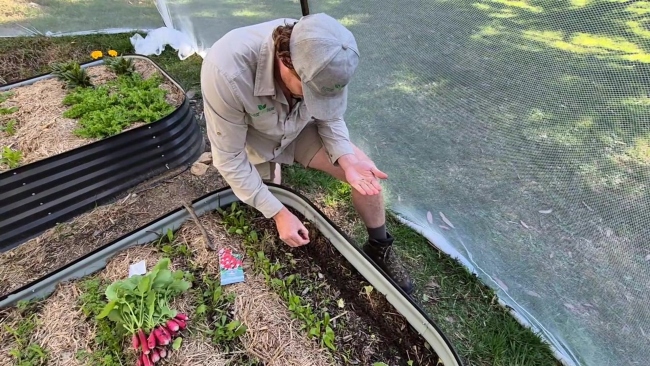
Growing French Breakfast Radishes from Seeds
Propagating French breakfast radishes is really simple. They will germinate reliably in most conditions, and be either sown in seed trays or directly in the ground.
We always sow radishes directly and would strongly advise everyone else to, simply because they are a very rapid crop, and transplanting can not only slow the process down but also deform the roots.
- Prepare the soil by removing any weeds and adding compost or fertiliser, and a light sprinkle of lime. Rake it to an even tilth, and create drills about 1cm deep and 10cm apart.
- Sow the seeds directly into the drills, and cover them over.
- Water with a light hose spray or a spray rose on your watering can until the ground is saturated.
- Germination usually takes 4-7 days.
- Once germinated, thin your radishes to a minimum of 2.5cm apart, but ideally 5cm, as French breakfast radishes have quite generous foliage, and you’ll want to avoid fungal infection by providing airflow between plants.
When to Sow French Breakfast Radishes in Australia
French breakfast radishes can be grown all year round in Australia, but do best in spring and autumn. In warm parts of the country, sow French breakfast radishes in early autumn, making successional sowings every two weeks for a regular crop.
In cooler parts of the country, sow your first batch of radishes in spring, and sow every two weeks in new rows to get a crop of radishes every fortnight until winter.
Ideal Conditions for Growing French Breakfast Radishes
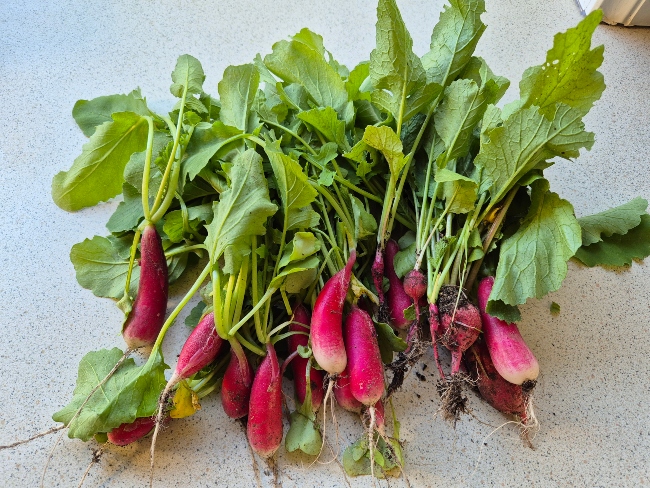
Before you sow your radishes, it's important to find the best location and prepare the soil properly. There are a few ways of doing this depending on where you live, and your garden soil, but fundamentally, French breakfast radishes need good drainage, regular watering, and 6 hours of sunlight per day.


Get Your Free Guide:
Master Growing Australian Natives eBook
A Must Have Complete Guide for Every Australian Garden
Get Your Free Guide:
Master Growing Australian Natives eBook
A Must Have Complete Guide for Every Australian Garden
We prepare our radish beds in summer every year, by adding an inch of well-rotted manure and digging it through. We then leave that to settle for a fortnight, watering once or twice. Then in early autumn, we’ll rake the ground to an even tilth, and sow directly. Every other year we add a sprinkle of lime to balance the soil pH.
Growing French Breakfast Radishes in Pots
If your garden soil isn’t ideal for French breakfast radishes because it is waterlogged, or heavy clay, you can create raised beds, or simply grow them in pots.
In fact, the easiest way to grow French breakfast radishes is to simply fill a pot with multi-purpose peat-free compost, and sow the seeds directly into the container. Water regularly, and in a few weeks you should have a decent crop of radishes.
How to Care for French Breakfast Radishes
French breakfast radishes don’t take much care, and they don’t give you much time to do it either. With crops ready in as little as four weeks (typically 6 weeks), feeding through soil preparation is the best option, but balanced liquid fertilisers will give plants a boost when they set leaves.
As for moisture, French breakfast radishes are easygoing, but watering once a week is generally sufficient, and twice a week in mid-summer to stop the roots from splitting, and prevent plants from bolting to flower.
Common Problems When Growing Radishes
Radishes are susceptible to quite a few common pests and diseases. The best way to avoid them is to rotate your growing beds, so that radishes are never grown in the same bed two years in a row, and never follow brassicas in a rotation.
Harvesting French Breakfast Radishes
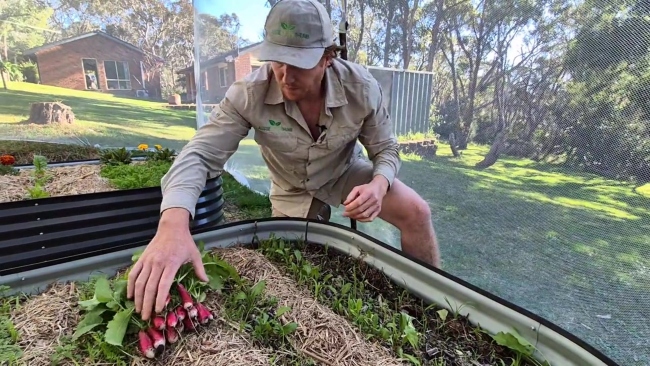
Harvest French breakfast radishes as soon as they are ready to eat. They should be about 2cm across and 3cm long for the best flavour but can grow to 5cm long by 3cm across and still be just as good.
The best way to store French breakfast radishes is in the crisper drawer of the fridge, where they can keep for up to a month. Freezing is possible but they will lose some of their texture.
French Breakfast Radish FAQs
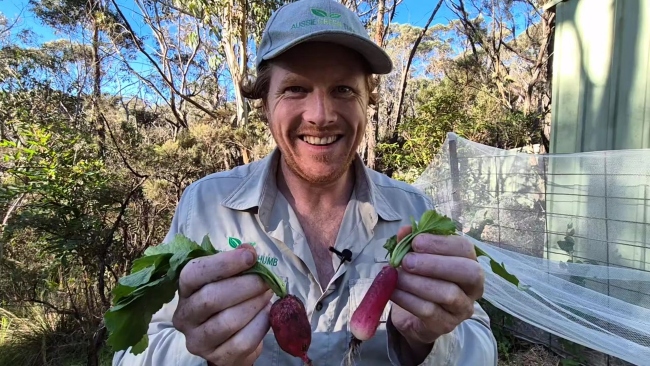
What is the difference between red radish and a French breakfast radish?
The flavour and colouring of typical cherry radishes is similar to French breakfast types, but French breakfast radishes are elongated and the leaves are better for eating.
Are French Breakfast radishes hot?
French breakfast radishes are not eye-wateringly spicy like some radishes, but they do have a bit of a spicy kick.
What is the best container for French Breakfast radishes?
The best container for French breakfast radishes needs to be about 1ft deep to allow for healthy downward root growth. Deeper containers also store water in the lower soil, which encourages French breakfast radishes to grow longer, towards the moisture.
Start Growing French Breakfast Radish
These French-tipped, manicured roots could be straight from a salon. If you’re considering growing radishes, French breakfast radishes are a perfectly punchy place to start.
Published on August 5, 2025 by Maisie Blevins
Last Updated on August 9, 2025




